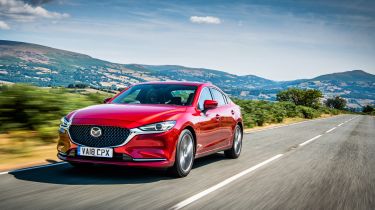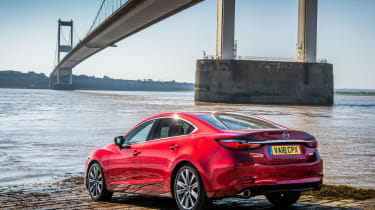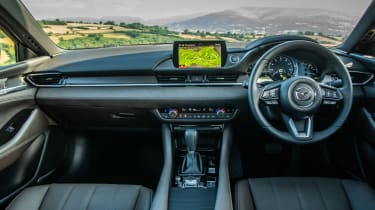New Mazda 6 2018 facelift review
Mazda's 6 gets another refresh with cabin quality and tech boosts but it's still the sharp drive that stands out

The refreshed Mazda 6 is still a fine family saloon, retaining its clear dynamic edge over the Volkswagen Passat. While being great to drive, it also takes the fight to the VW from a quality standpoint, thanks to its smartly updated and much more modern feeling cabin. This new 2.5-litre engine option isn’t our pick of the range though, and petrol buyers should stick to the more cost effective but sweeter 2.0-litre car instead. It's comfortably a four star car in the right spec.
The Mazda 6 has been around for a while now, so much so that this is actually the second time the Japanese firm’s flagship saloon has been updated in the UK following a mild facelift in 2015.
Despite its age relative to fresher competition like the Volkswagen Passat and Vauxhall Insignia Grand Sport, it’s still a car we rate quite highly, thanks mostly to the fact that it’s still one of the best saloons to drive outside of the Audi, BMW and Mercedes premium benchmarks.
Take a glance at the new Mazda 6 for 2018, and very little changes design wise from the outside. You’ll probably notice the new grille, which is deeper set and shinier than before with a new mesh, while updated headlights surrounded by a bit more chrome appear too. A few minor changes appear at the back in the form of a subtly redesigned rear bumper and bootlid, but the big news with this facelift is found in the cabin and under the bonnet – the interior has been refreshed again, while a new 2.5-litre four-cylinder petrol engine joins the Mazda 6’s power roster.
The fresh unit isn’t all that new, and is already equipped in the huge CX-9 SUV we don’t get in Britain, plus the smaller CX-5 in certain global markets. It seems to fly in the face of the current downsizing and turbocharging trends as well – 2.0 litres is as big as nearly all the Mazda’s four-cylinder rivals go. Given that this is a naturally aspirated engine too, there’s a definite old-school feel to the proposition.
Used - available now

2023 Audi
Q4 Sportback e-tron
54,526 milesAutomaticElectric
Cash £23,363
2022 Kia
Niro
18,315 milesAutomaticPetrol1.6L
Cash £17,900
2023 Nissan
Juke
40,858 milesManualPetrol1.0L
Cash £12,287
2022 Volkswagen
T-Roc
36,779 milesAutomaticPetrol1.5L
Cash £18,600What isn’t old-school is the cylinder-deactivation technology this engine is equipped with. Between 25mph and 50mph, two cylinders can drop out of operation to save fuel. It feels well executed, and you’ll struggle to notice the times when the engine is running at half its capacity. Claiming 42.2mpg on the combined cycle – about 34mpg in the real world– it isn’t actually that much thirstier than the smaller 2.0-litre petrol options Mazda offers as a result.
We’d still probably opt for the smaller engine though. Despite having 191bhp on tap, this 2.5-litre unit musters up just 258Nm of torque – not a huge figure in these turbocharged times. Out of its peak spot around 4,000rpm it doesn’t feel significantly faster than the cheaper 163bhp, 213Nm 2.0-litre car, which revs out more sweetly too. Two turbocharged 2.2-litre diesel options will cater for buyers seeking pulling power. They’ll arrive in September, equipped with selective catalytic reduction via a tank of Adblue, with the most powerful version now developing 181bhp and 445Nm of torque.
The 2.5-litre is at least smooth and quiet when cruising along, only becoming vocal if you stand on the throttle. As such, it’s an easy car to live with on the motorway. The six-speed automatic equipped on our car didn’t seem slow-witted in any way, but the Mazda 6’s standard six-speed manual is slick to shift, and probably worth sticking with for most.
Mazda has revised the steering and suspension on the updated car in a bid to keep it at the front of the pack for driving fun. You’d probably have to drive old and new back to back to find the difference, but regardless, the Mazda 6 is still a top saloon for drivers. Accomplished, sharp steering makes placing it around bends a joy, and while the suspension set-up is slightly firmer than rivals, costing it points for comfort around town, there’s a real fluency to the way this car flows down a B-road.
In the cabin, a tiny redesign of the centre console layout, now with a smaller panel for climate control buttons, results in a decluttered environment. On high spec GT Sport Nav+ cars like ours it feels pretty premium in there too, solidly built and using nice materials including Nappa leather and real wood trim. Space for four adults is good, though the middle seat in the rear is tight and hampered by the transmission tunnel. With 480 litres of space there are more practical saloons out there, but it’s still big enough for daily life, and folding the rear bench to open up more room is simple.
Elsewhere, on high spec cars a seven-inch colour display is integrated into the instrument panel – lower down the range, cars stick with analogue dials. It’s not quite a system to rival the full width digital panels in rivals like Audi’s Virtual Cockpit set-up, but it’s sharp, and a welcome addition on the tech side of things. The infotainment display grows to eight inches with this facelift and it remains an easy system to use. It still crucially lacks Apple CarPlay and Android Auto compatibility but we’re told both will be available as options later.
A head up display is now standard on all models though, and most versions are well equipped for the money. Mazda has increased the amount of safety and assistance features fitted by default too, with blind spot monitoring with rear cross traffic alert, radar cruise control, lane keep assist and autonomous emergency braking fitted across the range.










